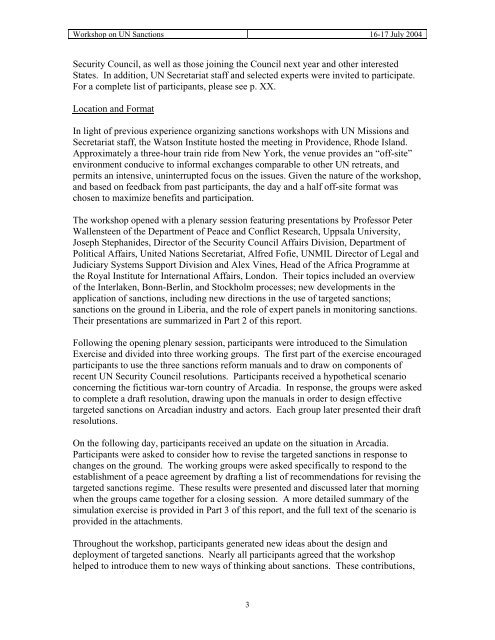UN Sanctions Reform - The Watson Institute for International Studies
UN Sanctions Reform - The Watson Institute for International Studies
UN Sanctions Reform - The Watson Institute for International Studies
Create successful ePaper yourself
Turn your PDF publications into a flip-book with our unique Google optimized e-Paper software.
Workshop on <strong>UN</strong> <strong>Sanctions</strong> 16-17 July 2004<br />
Security Council, as well as those joining the Council next year and other interested<br />
States. In addition, <strong>UN</strong> Secretariat staff and selected experts were invited to participate.<br />
For a complete list of participants, please see p. XX.<br />
Location and Format<br />
In light of previous experience organizing sanctions workshops with <strong>UN</strong> Missions and<br />
Secretariat staff, the <strong>Watson</strong> <strong>Institute</strong> hosted the meeting in Providence, Rhode Island.<br />
Approximately a three-hour train ride from New York, the venue provides an “off-site”<br />
environment conducive to in<strong>for</strong>mal exchanges comparable to other <strong>UN</strong> retreats, and<br />
permits an intensive, uninterrupted focus on the issues. Given the nature of the workshop,<br />
and based on feedback from past participants, the day and a half off-site <strong>for</strong>mat was<br />
chosen to maximize benefits and participation.<br />
<strong>The</strong> workshop opened with a plenary session featuring presentations by Professor Peter<br />
Wallensteen of the Department of Peace and Conflict Research, Uppsala University,<br />
Joseph Stephanides, Director of the Security Council Affairs Division, Department of<br />
Political Affairs, United Nations Secretariat, Alfred Fofie, <strong>UN</strong>MIL Director of Legal and<br />
Judiciary Systems Support Division and Alex Vines, Head of the Africa Programme at<br />
the Royal <strong>Institute</strong> <strong>for</strong> <strong>International</strong> Affairs, London. <strong>The</strong>ir topics included an overview<br />
of the Interlaken, Bonn-Berlin, and Stockholm processes; new developments in the<br />
application of sanctions, including new directions in the use of targeted sanctions;<br />
sanctions on the ground in Liberia, and the role of expert panels in monitoring sanctions.<br />
<strong>The</strong>ir presentations are summarized in Part 2 of this report.<br />
Following the opening plenary session, participants were introduced to the Simulation<br />
Exercise and divided into three working groups. <strong>The</strong> first part of the exercise encouraged<br />
participants to use the three sanctions re<strong>for</strong>m manuals and to draw on components of<br />
recent <strong>UN</strong> Security Council resolutions. Participants received a hypothetical scenario<br />
concerning the fictitious war-torn country of Arcadia. In response, the groups were asked<br />
to complete a draft resolution, drawing upon the manuals in order to design effective<br />
targeted sanctions on Arcadian industry and actors. Each group later presented their draft<br />
resolutions.<br />
On the following day, participants received an update on the situation in Arcadia.<br />
Participants were asked to consider how to revise the targeted sanctions in response to<br />
changes on the ground. <strong>The</strong> working groups were asked specifically to respond to the<br />
establishment of a peace agreement by drafting a list of recommendations <strong>for</strong> revising the<br />
targeted sanctions regime. <strong>The</strong>se results were presented and discussed later that morning<br />
when the groups came together <strong>for</strong> a closing session. A more detailed summary of the<br />
simulation exercise is provided in Part 3 of this report, and the full text of the scenario is<br />
provided in the attachments.<br />
Throughout the workshop, participants generated new ideas about the design and<br />
deployment of targeted sanctions. Nearly all participants agreed that the workshop<br />
helped to introduce them to new ways of thinking about sanctions. <strong>The</strong>se contributions,<br />
3
















